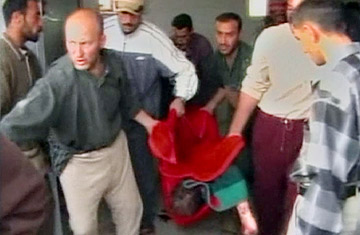
A frame grab from a video allegedly depicting an Iraqi civilian's body being carried in Haditha, Iraq, November 2005.
Few people will dispute the carnage that took place in the Iraqi town of Haditha on Nov. 19, 2005: Women and children were killed in their homes alongside adult males by U.S. Marines. The Marines originally said that the civilians were killed as a result of a roadside bomb. TIME first brought the incident and its contradictions to light in March 2006, beginning a series of official investigations and contributing to the loud public debate on the deployment of the U.S. military in Iraq. The trouble, however, has been with coming up with a prosecutable case against the Marines involved in the incident. The commander of the First Marine Expeditionary Force, Lt. Gen. James Mattis, is expected to decide in the next few weeks which charges, if any, to bring against three remaining Marines under investigation for the Haditha killings. The likelihood is that none of the charges will be for murder.
Mattis's decision will be based in part on the recommendations of Marine investigative lawyer Lt. Col. Paul Ware. Ware's reports have reached Mattis' desk and, according to an official familiar with the documents, all cite a concern that there is insufficient evidence to convince a jury that any of the Marines involved in the Nov. 17, 2005, shootings had committed murder. According to the reports, the evidence may not support a criminal intent to kill that is the burden of proof for a murder charge.
In the case of Staff Sgt. Frank Wuterich, who was supervising the squad that killed two dozen civilians that day, Ware recommended that Wuterich be charged with negligent homicide. That charge would allege that the 27-year-old enlisted Marine wrongfully killed civilians as a result of recklessness. Even this lesser charge, noted Ware, would be difficult to prove to a jury given the lack of evidence in the case.
Prosecutors in the Haditha case have struggled to collect evidence. Ware outlined concerns with the available evidence in a previous Haditha report made public in July recommending charges against Lance Cpl. Justin Sharratt be dismissed. Sharratt was a member of Wuterich's squad the day of the killings. Ware noted that the families of the victims refused to allow the bodies to be exhumed for autopsies. Furthermore, wrote Ware, Iraqi witnesses had a motive to fabricate their stories because Marine units had paid out cash to other families of those killed. "Witness accounts are not credible," wrote Ware. "The Iraqis' first statements to NCIS [Naval Criminal Investigative Service] were taken in a group setting, five months after the events occurred and with knowledge that other families in Haditha had received monetary compensation from the United States for events that occurred on 19 November 2005."
But Ware's concerns in the past have gone beyond issues of evidence. He also expressed concern with the impact a harsh sentence might have on the morale of Marines. "Even more dangerous is the potential that a Marine may hesitate at the critical moment when facing the enemy," wrote Ware in the Sharratt report. After weighing all the evidence available, Ware ultimately concluded that Sharratt had acted according to his training: "Whether this was a brave act of combat against the enemy or tragedy of misperception born out of conducting combat with an enemy that hides among innocents, LCpl Sharratt's actions were in accord with the rules of engagement and use of force."
So far Mattis's rulings have been favorable to the Marines. On August 9, Mattis decided not to bring charges against Sharratt. The general also dismissed dereliction of duty charges brought against Capt. Lucas McConnell, the company commander who oversaw Wuterich's squad and did not initially investigate the incident. Mattis said that "administrative measures are the appropriate response," limiting McConnell's punishment to a reprimand by his superiors rather than a trial in a criminal proceeding.
Mattis will decide in the next few weeks whether to move forward with the 17 counts of murder brought against Wuterich. It is unlikely, given the evidence, that Wuterich will be convicted of anything other than dereliction of duty, said the report. Mattis will make a similar decision on charges facing Lance Cpl. Stephen Tatum, a member of Wuterich's squad. Mattis will also decide whether to move forward with charges against batallion commander Lt. Col. Jeffrey Chessani. The investigating officer has recommended that Chessani face court-martial for dereliction of duty and other charges.
Public reprimands were handed to three senior officers in the chain of command on Nov. 19, 2005. Major Gen. Richard Huck, Col. Stephen Davis and Col. Robert Sokolosk were all handed letters of censure for failing to carry out their duties in sufficiently investigating the killings. The last remaining hearing in the case, scheduled for later this month, will be for intelligence officer 1st Lt. Andrew Grayson, who was first tasked with looking into what happened on that day.
